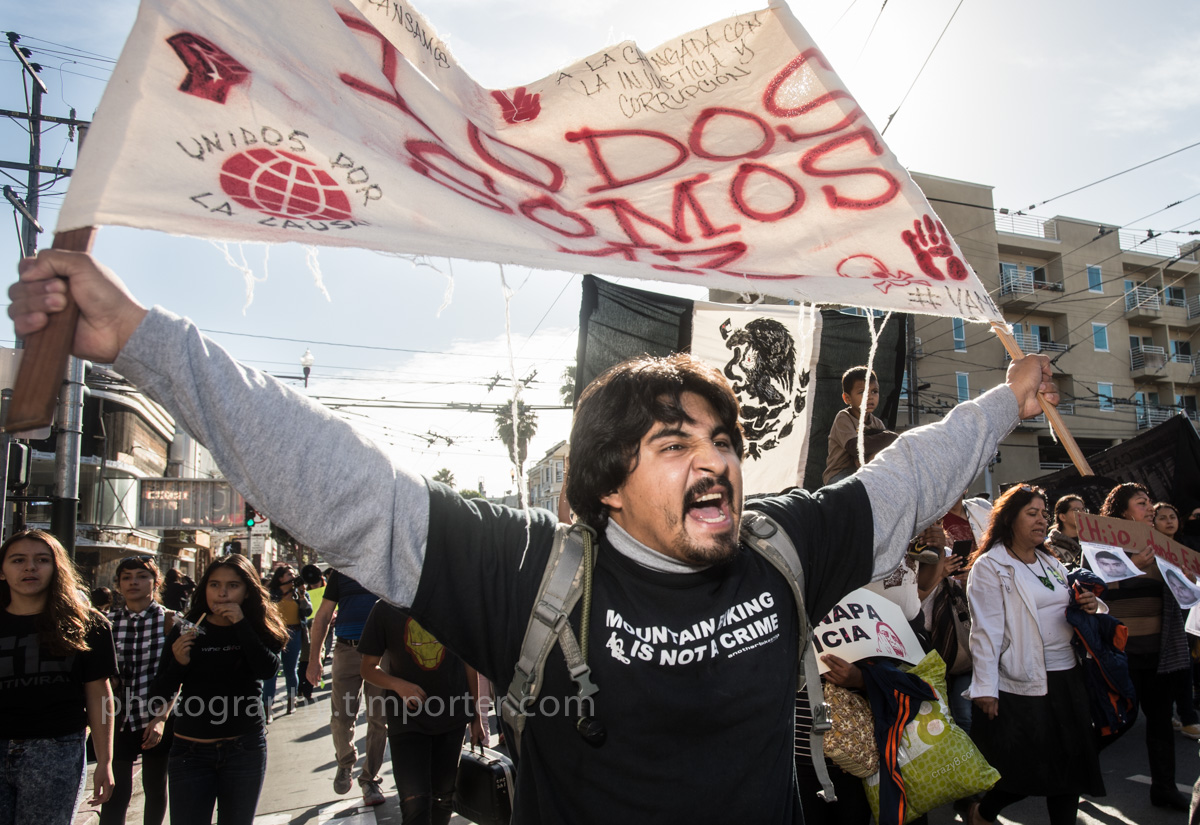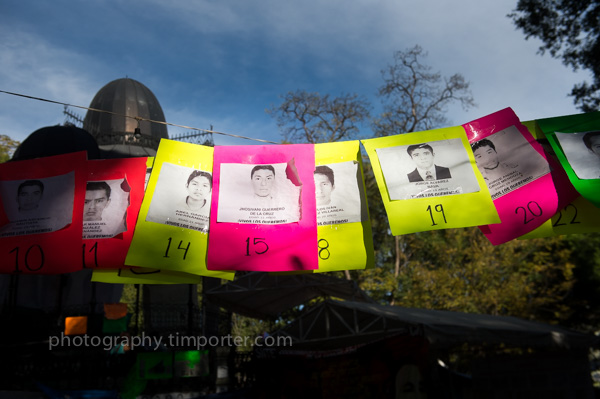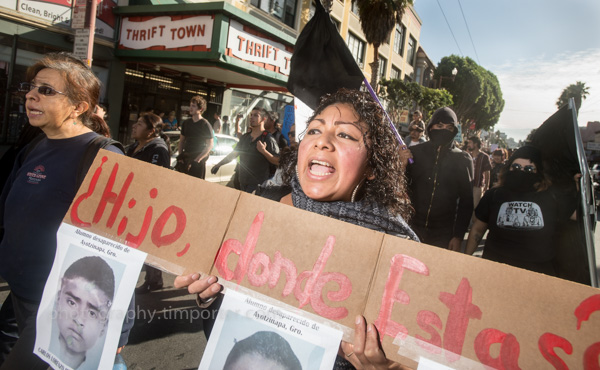
43 estudiantes. 43 jóvenes secuestrados en la noche. 43 hijas t hijos asesinados por las manos de la corrupción. 43 cuerpos descartados y quemados como la basura de la casa. 43 oportunidades perdidas por un futuro mejor. 43 más razones para llevar luto por México.
Los 43 alumnos universitarios asesinados murieron debido a que el 26 de septiembre apropiaron unos urbanos y bloquearon una carretera, una forma común de protesta política en México, y al hacerlo se metieron en las planes de la esposa del alcalde de Iguala, una de las más corruptas y violentas ciudades en Guerrero, uno de los más corruptos y violentos estados en México. Ella estaba en rumbo a dar un discurso, encontró la calle bloqueada, hizo una llamada a tu esposo. El Alcalde, José Luis Abarca ordenó a la policía local atacarlos. La policía entregó los alumnos a una pandilla criminal asociada con los narcos que controlan la región. Y los jóvenes desaparecieron.
Todo esto sucedió con la misma impunidad por la parte del alcalde, la policía y los narcos que infecta todo México y literalmente ha permitido asesinos de todos tipos para irse sin miedo de ser castigados por décadas.
Desde el comienzo de lo que ha venido a llamarse la guerra contra el narcotráfico en México, que se emprendió en el 2006 por el entonces presidente Felipe Calderón contra la red de los carteles que generan hasta $500 millones de la venta de drogas ilegales anualmente y controlan 90 por ciento de la cocaína que entra a Estados Unidos, la cifra oficial de la violencia entre los carteles, entre el gobierno y los carteles y entre los carteles y los ciudadanos inocentes de México – como los 43 estudiantes de Ayotzinapa — ha alcanzado 60,000 muertos. Eso es el numero oficial. Extraoficialmente, observadores de los derechos humanos calculan que el numero es 120,000.
Para poner esa cifra en perspectiva, hay que considerar que 58,220 Americanos murieron en la guerra entre Estados Unidos y Vietnam, un conflicto que incitó a la generación mía a llenar las calles de la capital estadounidense en protesta y eventualmente causó cambios vastos en la sociedad Americana.
Por supuesto, Vietnam era una guerra Americana y existía un reclutamiento que fomentaba más resistencia contra el conflicto, pero todavía se puede imaginarse que una guerra de letalidad similar que esta ocurriendo en un país visitado por 6 millones de Americanos cada año achisparía un poco de rabia aquí.
No es asi.
Hasta ahora, la posición oficial de Estados Unidos ha sido poco más de una tracción de hombros. La administración del Presidente Obama ha descrito el destino de los 43 alumnos y la respuesta insípida del gobierno del Presidente Enrique Peña Nieto como “preocupante.”
Eso puede cambiar. Las manifestaciones callejeras que comenzaron en Iguala después de la desaparición de los estudiantes se han extendido a lo largo del país y se han vuelto violentas en el D.F. Peña Nieto, que ignoró los secuestros por muchos días antes de mencionarlos públicamente y luego salio del país para una conferencia de comercio en China, ha regresado a escuchar a un número cada vez mayor de gritos pidiendo su renuncia (avivados en parte por la revelación que él y su esposa, una estrella de telenovelas, tiene una casa secreta con un valor de $7 millones en un enclave adinerado de la capital.)
Los medios de comunicación estadounidenses están reportando cada vez más el escándalo y las comunidades mexicana-americanas en Estados Unidos están organizándose y marchando con la esperanza de incitar más atención publica. Una de esas marchas ocurrió el sábado pasado en San Francisco, cuando 500 personas se encontraron en la esquina de los calles 24 y Mission, el corazón de la comunidad Hispana en San Francisco, para caminar al centro. Más manifestaciones están planeadas, una en coordinación con una huelga general establecida a ocurrir en México el 20 de noviembre, el aniversario de la revolución Mexicana, y otra en diciembre en 43 ciudades estadounidenses.
¿Que puedes hacer? Muchas cosas. Ya sea poco o mucho.
Escribe o tuitea a tu congresista. Dile que estas enojado, que estas harto, que quieres que el gobierno estadounidense reclame que su segundo mayor socio comercial limpie su casa. (El comercio entre México y Estados Unidos que suma en total a $6,000 millones en 2013.)
Si fumas marihuana o usas cocaína (¿y porque lo haces?), para. Casi toda la cocaína y mucha de la marihuana que los Americanos consumen viene a través de México. Tu diversión apoya los carteles, que a su vez corrompen el gobierno más, que engendra un estado de la impunidad, que permite crímenes de todos tipos – desde la evasión de los impuestos a la matanza en más – para continuar sin ser castigados.
Marcha. Camina en las calles con los Mexicanos que han venido a nuestro país, legalmente e ilegalmente, para escapar la misma corrupción que ha causado la muerte de los 43 estudiantes. Con más de 33 millones de persones que tienen origen Mexicano viviendo en Estados Unidos, esta guerra es tan nuestra come es de México.



